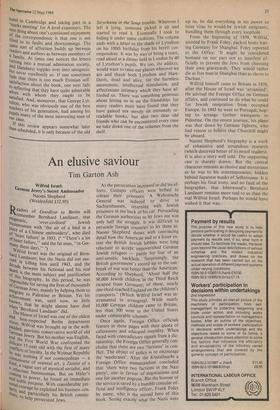An elusive saviour
Tim Garton Ash
Wilfrid Israel: German Jewry's Secret Ambassador Naomi Shepherd (Weidenfeld f 12.95) Reader's of Goodbye- to Berlin will remember Bernhard Landauer, that
enigmatic, 'over-civilised' Jewish
businessman with 'the air of a bird in a Piece of a Chinese embroidery', who died of `heart failure' in 1933. (` "There's a lot °f heart failure," said the fat man, "in Ger- Many these days." ')
, Wilfrid Landauer; but Israel was the original of Bern- nard the Nazis did not sue-
d in killing him until 1943, an the 'eedcacle between his fictional and hisd real ath is the main subject and justification f this biography. In this period, he was lesPonsible for saving the lives of thousands of German Jews, mainly by helping them to migrate to Palestine or Britain. Yet his
known, was, until now, so little
wrik°vvn, that he might almost have died when 'Bernhard Landauer' did. sd;e_ Th House of Israel was one of the oldest Ict best-respected Berlin department :)res. Wilfrid was brought up in the well- 1,)„,added, Patriotic conservative world of old v.:err/Ian
Jewry . But his mother was English, t! the First World War confronted the
u_ellcate 15-year old with the first of many c,oenflicts of loyalty. In the Weimar Republic st_. Was nothing if not cosmopolitan — a nnoisseur of oriental art, a Zionist of a Ind, a vague sort of mystical socialist, and egoreluetant businessman. But on Hitler's and ing to power, he found an immediate so noble purpose. With considerable per- taleltal courage he exploited his business con- tio s and Particularly his British connec- ns, to help persecuted Jews. As the persecution increased so did his ef- forts. Gestapo officers were bribed to release their prisoners. A Wehrmacht General was induced to drive to Sachsenhausen, returning with Jewish prisoners in the back of his car. Persuading the German authorities to let Jews out was only half the struggle. It was difficult to persuade foreign countries to let them in. Naomi Shepherd shows with convincing detail how the American and to a lesser ex- tent the British Jewish lobbies were long reluctant to accept impoverished German Jewish refugees — partly for fear of an anti-semitic backlash. Surprisingly, the British government's record up to the out- break of war was better than the American. According to Shepherd, 'About half the 60,000 Jewish children in the Third Reich escaped from Germany; of those, nearly one-third reached England on the children's transports.' (Which Wilfrid Israel was in- strumental in arranging). While nearly 10,000 German children came to Britain, less than 500 went to the United States under comparable schemes. Once again, Foreign Office officials feature in these pages with their quota of callousness and educated stupidity. When faced with contradictory signals from a dic- tatorship, the Foreign Office generally con- cludes that there are two 'factions' in con- flict. The object of policy is to encourage the 'moderates'. After the Kristallnacht a Foreign Office memorandum concluded that 'there were two factions in the Nazi party', one in favour of negotiations and one for another pogrom. But the honour of the service is saved by a humble consular of- ficial and intelligence officer, Frank Foley by name, who is the second hero of this book. Seeing exactly what the Nazis were
up to, he did everything in his power to issue visas to would-be Jewish emigrants, bundling them through every loophole.
From the beginning of 1939, Wilfrid, assisted by Frank Foley, packed boats leav- ing Germany for Shanghai. Foley reported to the Office: 'It might be considered humane on our part not to interfere of- ficially to prevent the Jews from choosing their own graveyards. They would rather die as free men in Shanghai than as slaves in Dachau.'
Wilfrid himself came to Britain in 1939, after the House of Israel was `aryanised'. He advised the Foreign Office on German affairs, and continued to do what he could for Jewish emigration from occupied Europe. In 1943 he went to Portugal, hop- ing to arrange further transports to Palestine, On the return journey, his plane was shot down by German fighters, who had reason to believe that Churchill might be aboard.
Naomi Shepherd's biography is a work of exhaustive and scrupulous research (which deserved better of its proof readers). It is also a story well told. The supporting cast is sharply drawn. But the central character remains as elusive and mysterious as he was to his contemporaries, hidden behind Japanese masks of Seibstironie. It is perhaps his final irony, and no fault of the biographer, that Isherwood's Bernhard Landauer remains more real to us than the real Wilfrid Israel. Perhaps he would have wished it that way.






































 Previous page
Previous page